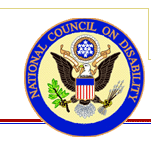Update on the UN Convention on the Rights of People with Disabilities
The Seventh Session of the Ad Hoc Committee on a Comprehensive and Integral International Convention on the Protection and Promotion of the Rights and Dignity of Persons with Disabilities met from January 16 to February 3, 2006 at the United Nations in New York City. This briefing paper relates developments during that session.
During the Sixth Session (August 1 – 12, 2005) the Ad Hoc Committee proceeded with work on the draft text starting with Articles 15, 24bis, and then 15bis and then proceeded through Articles 16 onward through Article 25.
Of Particular Note
The Seventh Session was an unprecedented three week long meeting, during which the Committee sought to complete a first reading of the updated and synthesized text issued by the Chair, Ambassador MacKay of New Zealand, in October, 2005.
The issue of legal capacity, which in large part addresses decision-making, remains a contentious issue that will need to be addressed at the 8th Session in August. In the past, the practice had been for someone to step in and basically take over the disabled person’s life, regardless of the individual’s ability to engage in assisted or supported decision-making. The Ad Hoc Committee is still grappling with the issue of how to address the full-spectrum of supported decision-making needs of different individuals (encompassing those who need little to no support as well as those who would need 100% support), and also the degree to which the Convention should address protections against possible abuse in supported decision-making situations.
There was a brief discussion at this session on international level monitoring and States came out with their positions on the subject. Part of the delay on the discussion of monitoring is because the UN human rights monitoring system is under review. A new Human Rights Council that would replace the UN Commission on Human Rights is being developed and there has been a lot of discussion about modifying the existing human rights treaty body system. Much more discussion will take place among governments intersessionally between now and August, with informal discussions facilitated by Mexico. There are some states that have come out in strong opposition to the creation of a separate treaty monitoring body for the convention. The majority, however, are stating that a separate treaty monitoring body is needed.
There is still no definition of disability and there will likely be a lot of discussion around the definition of disability in August.
Other Articles Discussed
During the three-week session, the committee concluded a full reading of the Chair’s, and reached broad agreement on the essential content of many of the articles. At the end of the session the Chair broke the text up into three general categories:
- no significant issues remaining
- articles with some issues remaining
- articles with difficult issues remaining
The Chair proposed that at the Eighth Session in August the Ad Hoc Committee concentrate on those articles with some or more difficult issues remaining. The articles that fall under those categories are:
“Some issues remaining”: - preamble
- definitions
- general obligations
- women with disabilities
- children with disabilities
- situations at risk
- freedom of expression and access to information
- respect for the home and family
- education
- habilitation and rehabilitation
- adequate standard of living
- social protection
- international cooperation
There were three articles that the Chair categorized as “difficult issues remaining” including Article 12 which is called Equal Recognition Before the Law; the Article of Protecting the Integrity of the Person; and the Article on Health. The Chair proposed that the focus be on those issues at the next session.
The Eighth Session of the Ad Hoc Committee will meet August 14 -25, 2006 at the United Nations in New York City. At the close of the Seventh Session, the Chair, Ambassador MacKay, indicated that it should be possible in August to reach accord on a draft convention on the rights of persons with disabilities. Noting that no human rights convention is perfectly drafted, he warned that the negotiations have reached a point of possible "diminishing returns," where existing agreed upon text could be "unraveled" by further negotiations. He thus encouraged members of the Ad Hoc Committee to work hard to commit to concluding negotiations at the next session, so as to preserve the advances achieved in much of the current text to date. Once the text has been finalized it will be sent to a technical drafting committee to review formatting and consistency (it will not address matters of substance), and then it will be submitted by the Ad Hoc Committee to the General Assembly for formal adoption and opening of the convention for signature by governments. The International Disability Caucus has indicated that it does not wish the negotiations to be unnecessarily delayed, but expressed that completion of the negotiations should not be at the expense of “a quality convention.” |

